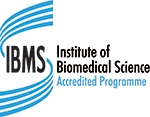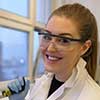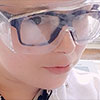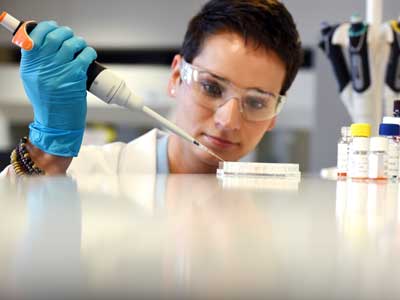Course overview
Science facilities in Bios
Check out our state-of-the-art facilities in Bios, with cutting-edge labs for science students in the School of Health & Life Sciences.
You undertake a broad range of clinical laboratory investigations in pathology, immunology and infectious disease control.
Professional accreditation for this degree comes from by the Institute of Biomedical Science, giving you the opportunity to train as a professional biomedical scientist. As a graduate you can pursue a career as an accredited biomedical scientist or a professional in the biomedical sector.
You explore fundamental concepts of human anatomy and physiology, cell biology, pathology, biochemistry, genetics, immunology and microbiology. Employability skills include good laboratory practice, COSHH assessments, health and safety policies, the Human Tissue Act, quality assurance, and transferable skills including verbal and poster presentations, written reports, independent research and teamworking. You experience key clinical laboratory skills from accredited biomedical scientists from local hospital trusts and industrial partners.
You study at our Middlesbrough campus, but during your degree you could gain valuable experience at the National Horizons Centre at our Darlington campus. This £22.3m purpose-built biosciences research, education and training facility is a focal point for the growing regional biosciences community.
Top reasons to study this course:
- Nationally recognised: Teesside University is ranked 2nd overall and top in the North East for Biomedical Science in the Guardian University Guide 2025. (68 institutions ranked, tees.ac.uk/source).
- Experienced teaching team: learn in lab sessions delivered by internationally-recognised researchers with expertise in disciplines including cancer, dementia, asthma and infectious diseases. Our staff have expertise in biomedical science with academics and practitioners from local hospital trusts and biotechnology companies.
- Accreditation: as a graduate you can train as an accredited biomedical scientist.
- Research opportunities: Gain the opportunity to conduct a research project at our £22.3m National Horizons Centre.
- Student satisfaction: 96.6% of biomedical sciences (non-specific) students agreed that their course has developed the knowledge and skills they think they will need for their future (National Student Survey 2024, tees.ac.uk/source).
Study this course and you may be eligible for the Cleveland Scientific Institution Scholarship (excluding those applying to the foundation year).
Course details
Course structure
Year 1 core modules
Gain basic knowledge of human anatomy and an understanding of the mechanisms associated with control and regulation of the physiological processes of the major organ system. Homeostasis is the key theme throughout the module, as you explore interrelationships between human functions and the organisational hierarchy to develop and increase your understanding of how the body functions. You also study the construction of biological profiles for human identification including sex, age at death, stature determination and biological affinity. This knowledge is used in the context of identification and recovery of human remains, the regulatory aspect of handing human remains and ethical issues related to human tissue research.
This is a 20-credit module.
Biochemistry and Chemical Science
Study the key principles of biochemistry, including the structure of the atom, chemical bonding and the forces that operate between molecules, chemical reactions and biological pathways. Investigate the chemistry of carbon and why this element is capable of forming the complex three-dimensional molecules that make life possible. Crucial groups of biological molecules are studied in detail, including proteins, carbohydrates, lipids, and nucleic acids.
This is a 20-credit module.
At a cellular level, you develop your understanding of biological processes. You explore the common features and immense diversity of form and function displayed by cells of organisms. You examine eukaryotic cell architecture and function with a molecular and mammalian focus and learn about cell division, the cell cycle, genetic organisation of cells, DNA replication and gene expression.
This is a 20-credit module.
Practical skills are essential to the role of a biomedical scientist working in a hospital lab environment. You are introduced to the basic principles of lab skills including good lab practice, accurate recording of experimental data and competency in basic lab procedures. You also cover a range of techniques used in handling and analysing clinical samples including point-of-care testing - here you learn to identify and report on blood types using common procedures in a biomedical haematology and transfusion lab.
This is a 20-credit module.
Microbiology is crucial in many aspects of life science. You study the fundamental aspects of microbiology, learn key practical skills and theoretical concepts covering a range of microorganisms including bacteria, viruses and eukaryotic microbes. You focus on microbial cell structure and function, microbial growth, microbial diversity, the importance of microbes in the environment, industry and human health. And you benefit from a strong practical element that introduces key microbiological lab skills.
This is a 20-credit module.
You gain an overview of normal histology and cytology of major organs and systems of the human body and molecular and cellular factors underpinning the pathology of common diseases. You examine the causes, mechanisms and extent of disease, as well as adaptations to injury, such as apoptosis and necrosis (death of living cells or tissues), autophagy, inflammation, wound healing and neoplasia (abnormal new growth of cells).
This is a 20-credit module.
Year 2 core modules
Clinical pharmacology encompasses all aspects of the relationship between drugs and humans. It is a diverse discipline that both sustains and advances best healthcare. You explore the nature of drugs as chemicals, which interact with cellular mechanisms at the molecular, systemic and behavioural level. Focus is on the treatment and prevention of disease and you consider the nature of adverse effects of drugs and other chemicals within living systems.
This is a 20-credit module.
Diagnostic and Experimental Pathology
Explore the various techniques involved in a biomedical laboratory to help identify the cause of disease. Procedures involved in the preparation, processing and staining of tissue for use in disease diagnostics and experimental research are introduced. Cellular pathology techniques such as microtomy, microscopy, staining and immunohistochemistry are examined in relation to alterations in cellular, tissue and organ function in different diseases.
This is a 20-credit module.
From fertilisation to infancy, through puberty and into adulthood, you take a journey through your own life. You also examine what happens when the human reproductive system doesn’t work properly, and how advances in reproductive medicine can help.
This is a 20-credit module.
Human Metabolism and Clinical Biochemistry
Gain an understanding of the human metabolism, endocrinology and clinical biochemistry. Examine metabolism, the chemical processes that occurs in living organisms, in the context of carbohydrate and lipid metabolism, cellular respiration and metabolism of drugs. Discuss endocrinology and review the mechanisms underpinning hormone action, the roles of second messengers and endocrine system disorders. Enzyme kinetics and enzyme regulation is a significant topic. Explore the methods used for collecting, measuring and analysing clinical samples in the biomedical lab. Learn the principles and applications of clinical biochemistry investigations used in screening, diagnosing, treating and monitoring disease.
This is a 20-credit module.
You gain a solid foundation in immunology and explore the immune system’s role in protecting against microorganisms and maintaining human health. Examine the functional organisation of the immune system, the immune cells and chemical mediators, antibodies, and cellular processes related to the innate and adaptive immune responses.
This is a 20-credit module.
Molecular Biology and Bioinformatics
You are introduced to a range of modern molecular biology concepts and techniques. You address general molecular biology, molecular biology of genetic diseases, and using molecular biology for applications such as the production of recombinant proteins, and biomedical science forensics. The new age of molecular biology is underpinned by gene/genome sequencing, sequence analysis and sequence manipulation. You explore the principles of sequence analysis and how these techniques have revolutionised molecular biology. Particular attention is on the technique of polymerase chain reaction (PCR). You learn the bioinformatics concepts around visualising and analysing DNA sequence data, and basic molecular data analysis. You gain insight into the theoretical aspects of molecular biology and bioinformatics, and learn the basic techniques of modern molecular biology such as DNA purification, PCR, restriction digestion, and nucleic acid analysis through agarose gels and sequencing.
This is a 20-credit module.
Final-year core modules
Explore the application of methods for the diagnosis and management of disease as well as the function and dysfunction of systems, organs and tissues by the measurement of biochemical biomarkers. Investigate modern analytical techniques used for the measurement of biochemical markers including the diagnosis, treatment and monitoring of disease such as liver and kidney function tests. You are also introduced to therapeutic drug monitoring methods, including those used to investigate drug abuse.
This is a 20-credit module.
You are introduced to genetic disorders, including chromosomal abnormalities, single gene disorders and birth defects with a genetic component, and learn to apply genetics knowledge to disorders seen in patients. Examine current and new techniques such as Next Generation Sequencing and understand advances in the NHS analysis of genetic disorders. Explore the ethics involved in whole genome sequencing and screening for genetic disorders.
This is a 20-credit module.
Clinical Haematology and Transfusion Science
Study the origin and creation of different types of blood cells (red, white, platelets), the roles of these in normal function, and how they are defective in blood disorders, including blood cancers. Learn about blood groups, antibodies, and other important considerations in transfusion as well as transplantation. Coagulation and associated disorders will also be covered. Train in preparing blood films and identifying disorders, blood groups and antibodies in blood samples, and recognising which blood can be donated to who.
This is a 20-credit module.
You examine key human pathogens with a clear emphasis on the subversion of host cells and causation of disease. You explore underlying molecular mechanisms, diagnosis, treatment and overall impact of many key pathogens. You gain an insight into how humans interact with a variety of non-pathogenic microorganisms and how they affect human health.
This is a 20-credit module.
You complete an in-depth, independent investigation into a specialist aspect of your field of study. You bring together a range of practical and academic skills developed in previous study, including analysing and critically evaluating data and a critical reflection on the potential risks, and moral and ethical issues. You are supported by a research supervisor who helps you develop and complete your research project.
This is a 40-credit module.
Modules offered may vary.
How you learn
This course aims to produce graduates who are competent in a range of knowledge, understanding, experience and practical skills appropriate to biomedical science.
You learn through a range of teaching and learning methods including:
- lectures
- tutorials
- seminars and workshops (including oral presentations and poster sessions)
- laboratory work
- computer laboratory-based sessions
- group projects
- research projects.
The course provides a number of contact teaching and assessment hours, but you are also expected to spend time on your own - self-study time - to review lecture notes, prepare coursework assignments, work on projects and revise for assessments. Each year of full-time study consists of modules totalling 120 credits and each unit of credit corresponds to 10 hours of learning and assessment (contact hours plus self-study hours). So, during one year of full-time study you can expect to have 1,200 hours of learning and assessment
Each programme and module is supported by a specific virtual learning environment (VLE) site.
How you are assessed
You may be assessed through:
- formal exams including 'unseen' exams
- laboratory reports
- computer-based assessments
- problem-solving exercises
- data interpretation exercises
- critical analysis of case studies
- oral presentations and technical interviews
- essays, literature surveys, evaluations and summaries
- collaborative project work
- preparation and display of posters
- planning, conduct and reporting of project work
You will be provided with an assessment schedule providing details of the submission deadlines for summative assessments.
Our Disability Services team provide an inclusive and empowering learning environment and have specialist staff to support disabled students access any additional tailored resources needed. If you have a specific learning difficulty, mental health condition, autism, sensory impairment, chronic health condition or any other disability please contact a Disability Services as early as possible.
Find out more about our disability services
Find out more about financial support
Find out more about our course related costs
Entry requirements
Entry requirements
Year 1 entry
96-112 UCAS tariff points
You must have studied at least one relevant subject at Level 3. Eligible subjects include:
Biology
Chemistry
Applied Science
Typical Level 3 qualifications include:
A levels (within a minimum of grade C from one relevant subject)
BTEC Extended Diploma
Access to HE Diploma
Alternative equivalent UK and international qualifications and subjects are also considered. If you are not eligible for Year 1 entry, we also offer this course with an integrated foundation year
Direct entry to later years
If you have previously studied a relevant subject at a higher level (HNC, HND or one or more years of a degree at another institution) we can consider you for direct entry to Year 2 or Final Year of this course. Please provide us with a complete detailed transcript of your previous studies with your application to help us determine your eligibility for advanced entry.
Applicant Days
If you receive an offer to study with us you may be invited to attend one of our Applicant Days. This is a great opportunity to learn more about studying at Teesside by exploring our campus, seeing our excellent facilities, meeting staff and students, and finding out more about your course.
The Applicant Day provides you with information, guidance and advice to help you make the right choice. Even if you have attended an Open Day we encourage you to attend the Applicant Day - we are confident you will find your visit a useful experience.
Alternative progression routes
If you are not eligible to join this course directly then we may be able to help you prepare for admission by studying appropriate pre-degree Summer University modules.
Please contact us to discuss the alternative progression routes available to you.
Non-EU international students
Non-EU international students who need a student visa to study in the UK should check our web pages on UKVI-compliant English language requirements. The University also provides pre-sessional English language courses if you do not meet the minimum English language requirement.
For general information please see our overview of entry requirements.
International applicants can find out what qualifications they need by visiting Your Country.
You can gain considerable knowledge from work, volunteering and life. Under recognition of prior learning (RPL) you may be awarded credit for this which can be credited towards the course you want to study.
Find out more about RPL
Employability
Career opportunities
The biomedical science degree gives you a strong foundation of knowledge in a diverse range of topics, presenting many career choices, including certified biomedical scientist, healthcare scientist or laboratory technician.
Opportunities to pursue a career in medicine or other clinical disciplines, such as pharmacy or as a physician associate are also open to you. Biotechnology and pharmaceutical industries welcome biomedical science graduates in research and development, quality assurance and sales. Publishing companies and the specialist press may also employ biomedical sciences graduates as writers or editors.
You may wish to continue your education by studying for a Master of Science (MSc), Master of Research (MRes) or Doctor of Philosophy (PhD).
Information for international applicants
Qualifications
International applicants - find out what qualifications you need by selecting your country below.
Select your country:
Useful information
Visit our international pages for useful information for non-UK students and applicants.


 BSc (Hons) Biomedical Science
BSc (Hons) Biomedical Science BSc (Hons) Biomedical Science
BSc (Hons) Biomedical Science

